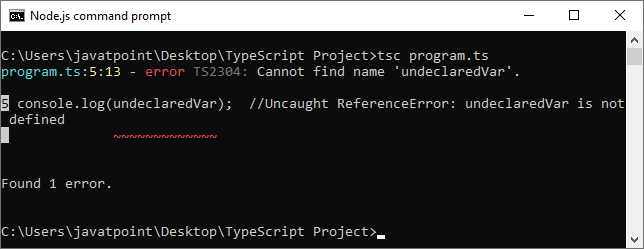📌 相关文章
- 解释 JavaScript 中未定义和未定义的区别(1)
- 解释 JavaScript 中未定义和未定义的区别
- $ 未定义 (1)
- ++*p、*p++ 和 *++p 之间的区别(1)
- B树和B +树之间的区别(1)
- $a != $b 和 $a !== $b 之间的区别(1)
- ++ * p,* p ++和* ++ p之间的区别
- ++*p、*p++ 和 *++p 之间的区别
- i++ 和 ++i 之间的区别 (1)
- C和C#之间的区别(1)
- C 和 C# 之间的区别
- C 和 C# 之间的区别(1)
- C和C#之间的区别
- C和C++之间的区别(1)
- C和C++之间的区别
- (*m) [5] 和 *m [5] 之间的区别 (1)
- ++ * p,* p ++和* ++ p之间的区别(1)
- C和C#之间的区别(1)
- $a != $b 和 $a !== $b 之间的区别
- C和C++之间的区别
- C和C++之间的区别(1)
- B树和B +树之间的区别
- C和C#之间的区别
- x 未定义 python (1)
- $ 未定义 - Javascript (1)
- x 未定义 python 代码示例
- Python和C#之间的区别
- Python和C++之间的区别
- python中和之间的区别(1)
📜 空和未定义之间的区别
📅 最后修改于: 2021-01-11 12:19:39 🧑 作者: Mango
空和未定义之间的区别
空值
Null用于表示故意缺少值。它代表一个变量,其值是不确定的。它仅接受一个值,该值为null。 Null关键字用于在TypeScript中定义Null类型,但是它没有用,因为我们只能为其分配一个null值。
例
//Variable declared and assigned to null
var a = null;
console.log( a ); //output: null
console.log( typeof(a) ); //output: object
输出:

未定义
它表示TypeScript和JavaScript中的未初始化变量。它只有一个未定义的值。 undefined关键字在TypeScript中定义了undefined类型,但是它没有用,因为我们只能为其分配一个undefined值。
例
//Variable declaration without assigning any value to it
var a;
console.log(a); //undefined
console.log(typeof(a)); //undefined
console.log(undeclaredVar); //Uncaught ReferenceError: undeclaredVar is not defined
输出:

空值与未定义
Null和Undefined之间的重要区别是:
| SN | Null | Undefined |
|---|---|---|
| 1. | It is an assignment value. It can be assigned to a variable which indicates that a variable does not point any object. | It is not an assignment value. It means a variable has been declared but has not yet been assigned a value. |
| 2. | It is an object. | It is a type itself. |
| 3. | The null value is a primitive value which represents the null, empty, or non-existent reference. | The undefined value is a primitive value, which is used when a variable has not been assigned a value. |
| 4. | Null indicates the absence of a value for a variable. | Undefined indicates the absence of the variable itself. |
| 5. | Null is converted to zero (0) while performing primitive operations. | Undefined is converted to NaN while performing primitive operations. |